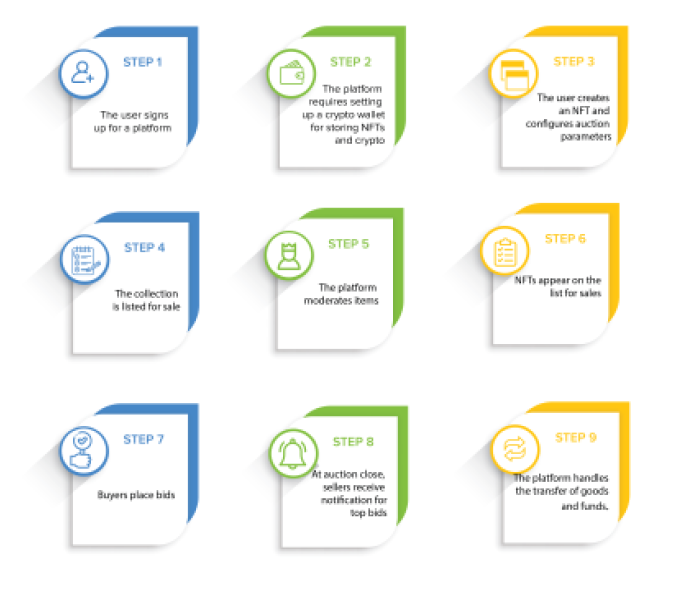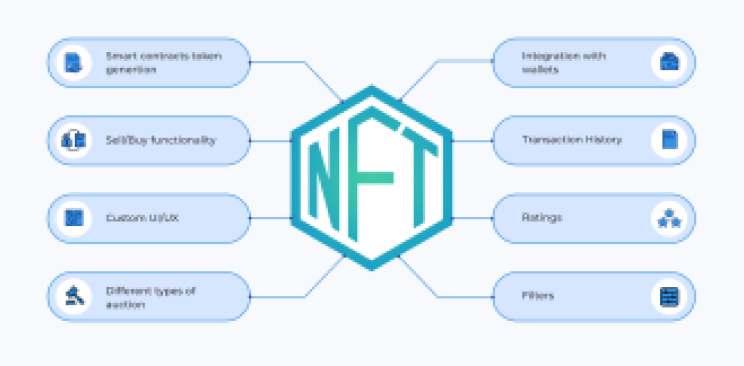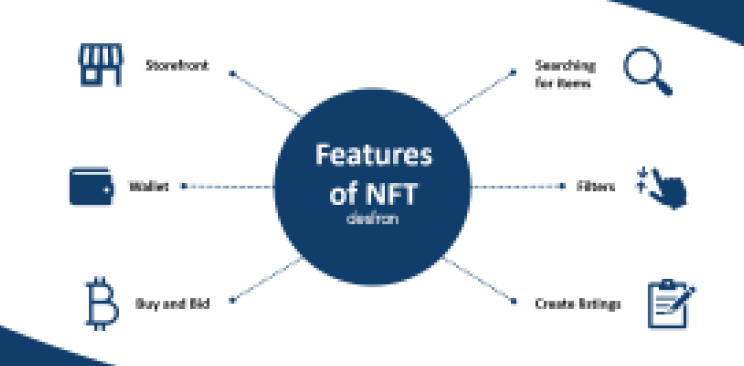What Is NFT?
NFT Marketplace: How it generally works?
NFT marketplace is a user-friendly marketplace for NFTs where artists and investors can come to sell and buy them. Although the logic here is quite basic, it is to be noted that merging all this on a highly secured blockchain in the back-end is not simple as it seems. To simplify things, let’s precisely understand how an NFT marketplace functions.

Smart contracts
NFT marketplace works solely on intelligent contracts. As mentioned above, whenever there’s an NFT transaction, no tangible and real asset is transferred between the seller and buyer. Instead, a legal & smart contract is signed between them that validates the ownership transfer. These contracts are self-executing in nature and are stored on blockchains.
Crypto Wallets
Since all NFTs transactions occur on the blockchain, one cannot use currency like a dollar to invest in them. The entire ecosystem works on a decentralized blockchain system named Ethereum that facilitates the execution of smart contracts. Crypto wallets become a must to store and spend Ether (cryptocurrency of the platform) while selling and buying an NFT.
Sales and Auction
- The minimum bid for their Non-Fungible-Token.
- The expiration timeline for the auction to end.
- The selling price for a fixed-price sale
- Rest everything will be looked after by the marketplace itself.
Gas Charges
Maintaining records of the transaction on the blockchain can get sometimes be expensive. The entire function requires a lot of computing efforts and energy and thus cannot be dismissed. Therefore, the blockchain wallets charge a gas fee named as the operational cost per transaction. The NFT marketplace will be entirely responsible for integrating the same when completing any transaction on NFTs.
What are the benefits of creating an NFT Marketplace?

1- Versatile Development Methods
Knowing the scope of growth opportunities an NFT marketplace creates, the options to build a platform like that are diversified. You can always opt for out-of-the-box things with the platform and make it more personalized, user-friendly, and result-oriented. Implementation of Different Blockchains Since Blockchain is the primary technology behind the concept of NFTs, you can use it in different functionalities and processes in your marketplace. You can also use it for trading, currency conversion, data authentication, and even execution of condition-bound protocols.
2- Easy Development & Deployment
Developing and deploying the NFT marketplace can be as complex or simple as any other mobile/web app. You might need to develop a complete infrastructure to meet the demands of the users selling or buying NFTs on your platform. You can also allow third-party integration to allow users to add, pay, convert, or remit funds.
What are the must-have features in your NFT Marketplace?
What make an NFT marketplace consumers’ favorite are the features it offers. The ease of payment, interactive checkout, execution of all transactions, and appealing user interface can be some of the top features that let your platform come out better than your competitors in the market. This article sheds great aspects on some of the crucial features that you cannot miss adding to your own NFT marketplace.

Storefront
The primary concept of an NFT marketplace is no different from that of an eCommerce marketplace that means you can indeed consider the same approach for deploying or creating these platforms to some extent. Storefront acts as the main face of your marketplace where consumers would view different products and other details, such as auction window or price.
Search Functions
An NFT marketplace UX/UI design company can add advanced search buttons to find items of their interests fast and more precisely. They can amplify the scope of search results as there can be a massive range of niches of products listed on the marketplace. Being more specific about the search functions will allow your marketplace to engross in a smoother buying process.
Wallet
Consumers are asked to add a digital wallet to sell or purchase any products using the NFT marketplace. It should be ensured that the digital platform supports maximum crypto wallets and engage in quick, flawless, and secure transactions.
Listings
To make the product listing hassle-free on the marketplace, developers can engage in accessible navigation elements on the platform. They can likewise include instructions to inform users about the uploading and selling process on the NFT marketplace.
Ratings & Feedback
This feature can help to ensure the credibility of different traders in a marketplace.
How to Create an NFT Marketplace
1- Know Your Target Audience
The very initial step of the process to build an NFT marketplace is to identify who your requested audience will be and what they expect as your audience. It will assist you in personalizing the platform more effectively.
2- Select Domain Name
A domain name is probably a business name. So, it is crucial to be careful while selecting domain types and defining the domain name. You can buy the domain and hosting services from the service provider of your choice, such as Hostinger, GoDaddy, etc.
3- UI Development
Once you have a clear-cut picture of what your marketplace will like, your UX/UI design company developers can work on its design. They will code the webpage and UI components with the help of a flow or the wireframe given by the business team.
4- Implementation of Features
You have already read the fundamental features of an NFT marketplace above. After setting up the Blockchain and developing a UI by hiring a web development team, we can implement the mandatory features using an advanced programming language.
5- Integrating Digital Wallet
Integration of a third-party digital wallet will allow your NFT marketplace to initiate secure, encrypted, fast, and simple transactions without affecting the regular functionality of the platform as a whole.
6- Choosing Blockchain Model
Blockchain is the chief technology enabling the operation of an NFT marketplace. You would require smart contracts to indulge in the proper execution of all conditions defined by the sellers. Choosing the correct Blockchain platform also depends upon the strength of the community your product will be targeting.
7- Select Base Tokens
Most NFT marketplaces are using Ether, a native cryptocurrency built from the Ethereum Blockchain platform. However, technically, any user can buy NFTs using any type of cryptocurrency.
8- Test & Launch
As you have a product ready to use, you can perform testing on different grounds. You can test its usability, functionality, and other significant elements with the help of quality testers. A well-tested product gets away from any real-time discrepancies and process loopholes.
Conclusion
It is clear-cut to see a rise in the creation of NFT marketplaces. Passionate business leaders can imagine the future of NFT marketplaces and a plethora of growth-oriented business possibilities packed with it. Whizcamp is a recognized and innovative (technology/startup/ product development) company. We have been serving the global clientele of fortunate business leaders across industries. We can assist you in building a rich-featured, user-oriented, and revenue-generating marketplace using our expertise in delivering NFT marketplace development solutions.
FAQs about NFT Marketplace Development
Which are the most in-demand NFT Marketplaces?
There are many popular NFT marketplaces to buy and sell digital art and other virtual collectibles. Some are OpenSea, Rarible, SuperRare, Foundation, Nifty Gateway, etc.
How does an NFT marketplace generate money?
NFT marketplace generates revenue in two ways. They generally make money by charging a fee and commissions to buy or sell an NFT. A seller’s fee is deducted from the actual price, while a buyer’s payment is added to the total cost.



